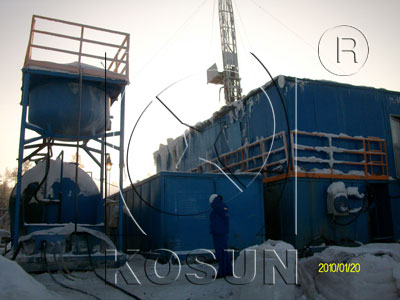- Home
- Products
-
-
Solids Control Equipment
- Shale Shaker/Linear Motion Shale Shaker
- DC Series Decanter Centrifuge
- Mud Cleaner
- Vacuum Degasser
- Centrifugal Pump
- Shear Pump
- Submersible Slurry Pump
- Mud Agitator
- Mud Gun
- Jet Mud Mixer
-
Solids Control System
- TUNNEL BORING MUD SYSTEM (TBM)
- HDD Mud Recovery System
- Skid-mounted Solids Control System
- Mobile Solids Control System
- Arctic Solids Control System
-
-
- Topics
- News
- Services
- Marketing
- About Us
- Contact Us
Home > KOSUN News >
Advantages and Disadvantages of Water- and Oil-based Mud
Dec 04, 2012
READ: Shale gas has a complex composition of minerals. Water easily smells clay minerals. This can hinder normal drilling, result in complicated down hole problems like collapsing wall as well as pollute drilling fluids and impact capacity in later production. Mostly due to this, oil-based mud is required.
Shale gas has a complex composition of minerals, extending to such common ones as kaolinites, montmorillonites, illites, as well as quartzs, feldspars, mica calcites, dolomites, iron pyrites, apatites, etc. Water easily smells clay minerals. This can hinder normal drilling, result in complicated down hole problems like collapsing wall as well as pollute drilling fluids and impact capacity in later production. Mostly due to this, oil-based mud is required.

Vertical well can try water-based mud, but it is less economical than horizontal wells for extracting shale gas. Horizontal drilling is always used for shale gas exploration, mostly along the direction of minimum principal stress, which makes shale formation proner to collapse than ever. Oil-based mud is endowed with better capabiliy to stablize the wall than water-based mud.
1. Water-based mud can swell shale formation, a brittle mineral, collapse boreholes and impact drilling outcome in the drilling operations;
2. Gases produced among shale cracks whose non-organic part is possbly aqueous wetting phase can be easily displaced by water, offsetting the well loggings.
3. Water-based mud can easily block the layers of very low permeability and influence the capability.
4. Oil-based mud can support the shale formation and its oil molecules cannot penetrate into tiny organic and non-organic pores under the capillary pressure.
Accordingly, it makes great difference to drilling operations with the assistance of the oil-based mud, concocted with certain amount of support agent. And, in horizontal drilling, rotary steering, hole trajectory and well cementing are vital technologies, or an integrated auxiliary technology assembly.
